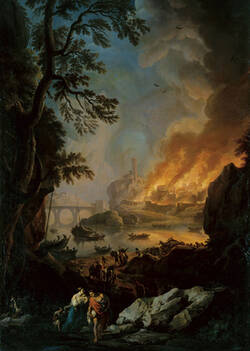From the novel „Istanbul: Memories and the City“
Although fires were many and frequent through the five hundred years of Ottoman rule, it was during the nineteenth century particularly that people began to prepare for them. The residents of wooden houses in Istanbul’s narrow streets did not think of fires as avoidable disasters so much as grim certainties they had no choice but to face. […]
But for those of us who watched the city’s last yalıs, mansions and ramshackle wooden houses burn down during the 1950s and 1960s, the pleasure we derived had its roots in a spiritual ache different from that of the Ottoman pashas, who thrilled to them as spectacles; this is the guilt, loss and jealousy we feel at the sudden destruction of the last traces of a great culture and a great civilisation that we were unfit or unprepared to inherit in our frenzy to turn Istanbul into a pale, poor, second-class imitation of a Western city.
From the book “The Consolation of Objects“:
In my childhood soul, the excitement of trying to save lives and belongings from a fire must have been mixed with the fear of the angels of punishment felt in hell; in any case, I added Islamic angels of punishment, devils, and demons to the work from the Old Masters Picture Gallery entitled A Burning City.
Multimedia
Guide
Guide
Additional Navigation Points
Search Tours
Use the convenient filters to narrow down tours and find the perfect guide for you.
TitleText
Night mode
Reset Settings
Are you sure to reset the Multimedia Guide system to factory settings?
That's how it works!
Erfolge
Nachtmodus
Es werde Nacht
Guide
Tour durchgehört
Home sweet home
Logo 3x klicken
Merkzettel
Nutze den Merkzettel
QR
Nutze den QR-Code-Scanner
Hacker
Objekt 1337 nicht gefunden
Clear bookmarks?
Are you sure to clear the list and remove all objects?
Switch tour
The chosen object is part of another tour. By proceeding you leave your current tour.
Masked Contents
If you choose one of the first two options, terms from historical work titles and handed-down descriptions that are racist or otherwise discriminatory will be displayed. The SKD dissociate themselves from this use of language and stand for a critical examination of it.
